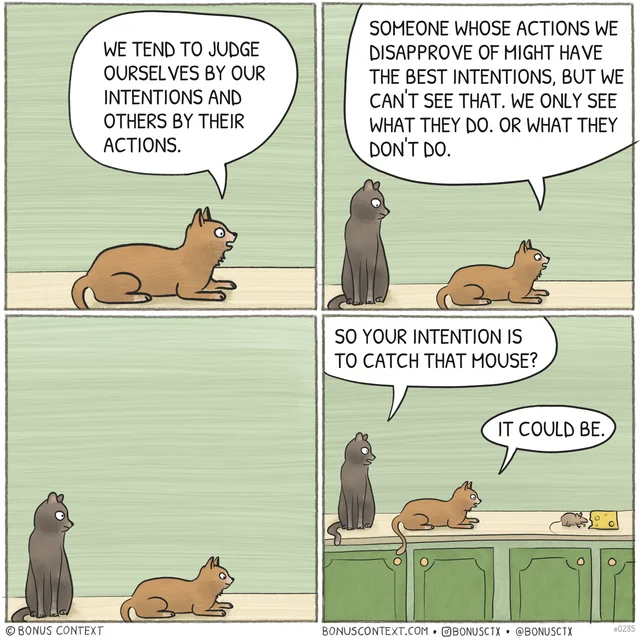
“Since the days of antiquity, those sitting in judgment of the gravest crimes have required evidence of a man’s intent and sought to classify his awareness of the moral implications of his actions. Even when one man kills another, we separate the accidental from the spontaneous and the spontaneous from the carefully planned—despite the fact that such distinctions provide no comfort to the dead.” (Amor Towles, Table for Two)
This topic is very complicated but extremely important. I’ve wrestled with it for months. I’ve written my current thoughts at the end of this post.
Intentions reveal the underlying reasons behind a person’s actions, providing insight into their true motivations and character. But whereas actions leave evidence, intentions are often silent and hard to verify. People often lie about their intentions, which creates an extra layer of ambiguity.
Ethically, the intent behind an action is often seen as a primary factor in judging its morality. While intentions are crucial, the consequences of an action still have real-world impact, and sometimes the negative outcomes of an action can’t be dismissed even if the intention was good. There’s even a difference between a well-intentioned action that results in a negative outcome and a malicious action that has a positive outcome.
Here’s where I’ve landed on this topic.
When someone offends me, I should consider their intentions.
For my own peace of mind and to be generous toward others, unless a bad intent is obvious, I should assume that people are acting with good intentions.
Recently, I got frustrated when someone wasted my time and money. I was quite stirred up until I considered intent. I realized she had not intentionally done what she did; there was no malice; she had just made a mistake. That thought helped me settle down.
When I offend someone else, I shouldn’t use intent as an excuse.
If I do something that hurts another person I should focus on my action and the outcome, not my intent. When I commit an offense I should not rely upon an innocent intent to ameliorate the incident. For instance, if I accidentally back my car into yours, I needn’t say, “But I didn’t mean to.” Regardless of my intent, your car is damaged and I should apologize and take responsibility to fix it.
If I regularly offend people, though I think my intentions are pure, I need to analyze my actions and adjust my behavior. Self-awareness combined with a humble and contrite attitude will motivate me to change and do better.
Intentions are the reasons behind what you do. Actions are the things that you actually do. Results are what happens as a result of actions. We are responsible for all three.

Excellent post Don, thank you so much for your insight on this topic!
Thanks, Randy, for taking the time to respond and for encouraging words. Don
Life is a great teacher if we only listen.
I always hesitate making comments on your posts. I don’t want to offend you with my comments😊
Blessings, Bro. Don!
Yolonda, don’t ever hesitate to share your thoughts. I always value people’s opinions. I hope you’re doing well.
Do I love this! Intentional doesn’t convince me, actions do. The Bible says which of the men was right? The man who said yes I will, but didn’t or the one that said no, but actually went? Love is action, but I think the root is the thought or intention. Sometimes intentions are careless or weak, you mean well, but when nothing comes to fruition, I have questions. Man up!(❤️ Please….)
Thanks, Kay, for taking the time to share your thoughts. You’re right, actions speak louder than words and perhaps louder than intentions. Take care.
Thank you Don for the article. I’m just thinking of what’s currently happening in the our government regarding lay offs . it’s hitting home and causing anxiety. Sadly the intentions and actions not affecting them but the people are being affected negatively by the result.
God help us
Thanks, Mary, for sharing your thoughts. I always value them. It’s sad that so many people are being affected by such sudden decisions. I hope it will work out for your good. Take care, Don